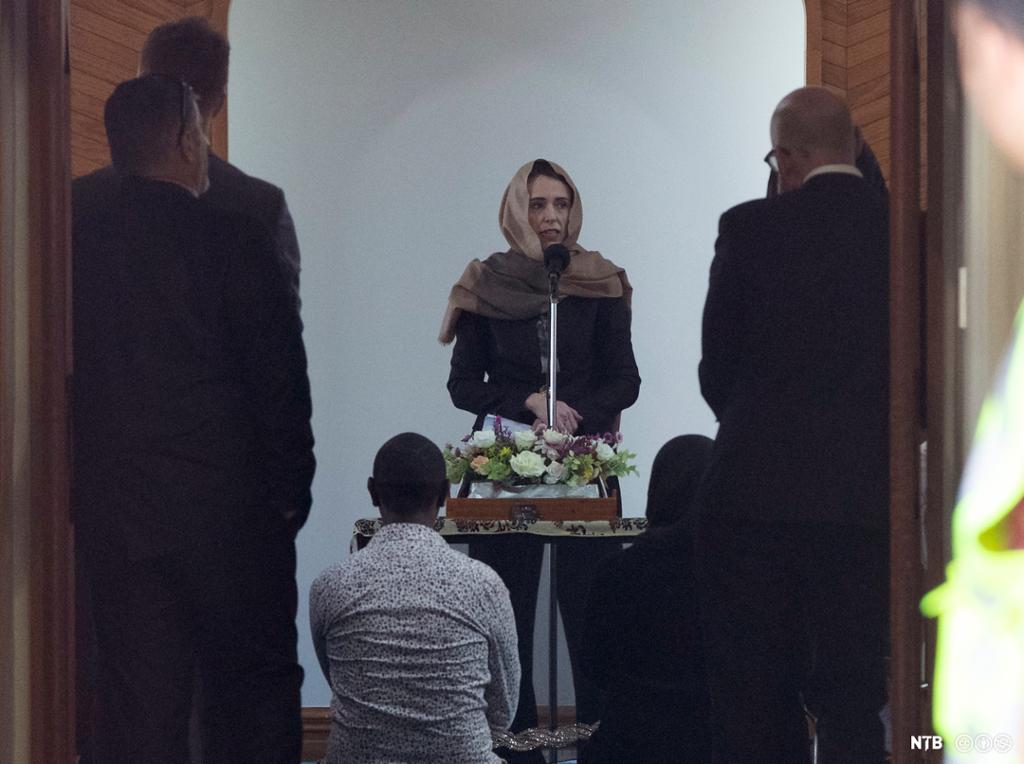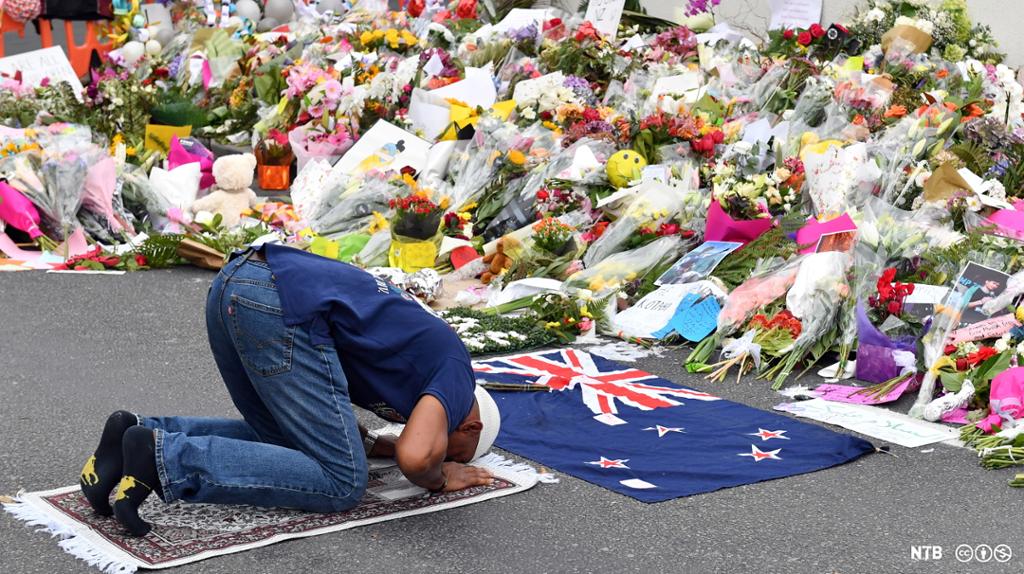Christchurch Mosques Terror Attacks by Jacinda Arden

Before attacking the mosques, the terrorist published an online manifesto. He live-streamed the shootings at the first mosque and was cheered on by online followers.
On 19 March 2019, Prime Minister Ardern gave a speech in New Zealand's parliament about the mosque shootings. Ardern made it clear that an attack on New Zealand's Muslim community was an attack on all New Zealanders. Ardern stood up against racism and far-right extremism and received much praise for her clear leadership.
The terrorist was sentenced to life in prison with no chance of parole. He is the first person in New Zealand to have received this strict sentence.
Maori and Arabic words used in the speech:
Prime Minister Ardern uses words from Maori and Arabic in the speech. Study the list of words and their meaning in English.
Arabic:
al salam alaikum – peace be unto you
wa rahmat allah wa barakatuh – mercy and blessings of the Almighty be upon you
Maori:
aroha – love/affection/sympathy/ compassion
manaakitanga – to extend aroha (love/affection/sympathy/ compassion) to others
Ko tātou, tātou – they are us
Why do you think the prime minister chose to incorporate these words and phrases into her speech?
"I wish to make a ministerial statement relating to the Christchurch mosque terror attacks. Al salam alaikum. Peace be upon you, and peace be upon all of us.
The 15th of March will now be for ever a day etched in our collective memories. On a quiet Friday afternoon, a man stormed into a place of peaceful worship and took away the lives of 50 people. That quiet Friday afternoon has become our darkest of days. But for the families, it was more than that. It was the day that the simple act of prayer, of practising their Muslim faith and religion, led to the loss of their loved ones' lives. Those loved ones were brothers, daughters, fathers, and children. They were New Zealanders. They are us. And because they are us, we, as a nation, mourn them. We feel a huge duty of care to them, and we have so much we feel the need to say and to do.
One of the roles I never anticipated having, and hoped never to have, was to voice the grief of a nation. At this time, it has been second only to securing the care of those affected and the safety of everyone. In this role, I wanted to speak directly to the families. We cannot know your grief but we can walk with you at every stage. We can and will surround you with aroha, manaakitanga, and all that makes us us. Our hearts are heavy but our spirit is strong.
Less than six minutes after a 111 call was placed alerting the police to the shootings at Al Noor Mosque, police were on the scene. The arrest itself was nothing short of an act of bravery. Two country police officers rammed the vehicle from which the offender was still shooting. They pulled open his car door, when there were explosives inside, and pulled him out. I know we all wish to acknowledge that their acts put the safety of New Zealanders above their own, and we thank them, but they were not the only ones who showed extraordinary courage. Naeem Rashid, originally from Pakistan, died after rushing at the terrorist and trying to wrestle the gun from him. He lost his life trying to save those who were worshipping alongside him. Abdul Aziz, originally from Afghanistan, confronted and faced down the armed terrorist after grabbing the nearest thing to hand—a simple EFTPOS machine. He risked his life, and no doubt saved many, with his selfless bravery. There will be countless stories, some of which we may never know, but to each we acknowledge you in this place, in this House.
For many of us, the first sign of the scale of this terrorist attack was the images of ambulance staff transporting victims to Christchurch Hospital. To the first responders, the ambulance staff, and the health professionals who have assisted and who continue to assist those who have been injured, please accept the heartfelt thanks of us all. I saw first-hand your care and your professionalism in the face of extraordinary challenges. We are proud of your work and incredibly grateful for it.
[ ...]
I know, though, that there have, rightly, been questions around how this could have happened here in a place that prides itself on being open, peaceful, diverse, and there is anger that it has happened here. There are many questions that need to be answered, and the assurance that I give you is that they will be. Yesterday, Cabinet agreed that an inquiry—one that looks into the events that led up to the attack on 15 March—will occur. We will examine what we did know, could have known, or should have known. We cannot allow this to happen again.
Part of ensuring the safety of New Zealanders must include a frank examination of our gun laws. As I've already said, our gun laws will change. Cabinet met yesterday and made in-principle decisions 72 hours after the attack. Before we meet again next Monday, these decisions will be announced.
There is one person at the centre of this terror attack against our Muslim community in New Zealand. A 28-year-old man, an Australian citizen, has been charged with one count of murder; other charges will follow. He will face the full force of the law in New Zealand. The families of the fallen will have justice. He sought many things from his act of terror, but one was notoriety, and that is why you will never hear me mention his name. He is a terrorist, he is a criminal, he is an extremist, but he will, when I speak, be nameless, and to others I implore you: speak the names of those who were lost rather than the name of the man who took them. He may have sought notoriety but we in New Zealand will give him nothing—not even his name.
We will also look at the role social media played and what steps we can take, including on the international stage and in unison with our partners. There is no question that ideas and language of division and hate have existed for decades, but their form of distribution, the tools of organisation—they are new. We cannot simply sit back and accept that these platforms just exist and that what is said on them is not the responsibility of the place where they are published. They are the publisher, not just the postman. There cannot be a case of all profit, no responsibility.
This of course doesn't take away the responsibility we too must show as a nation to confront racism, violence, and extremism. I don't have all of the answers now, but we must collectively find them and we must act. We are deeply grateful for all the messages of sympathy, support, and solidarity that we are receiving from our friends all around the world, and we are grateful to the global Muslim community who have stood with us, and we stand with them.
[ ...]

As I conclude, I acknowledge that there are many stories that will have struck all of us since 15 March. One I wish to mention is that of Hati Mohemmed Daoud Nabi. He was a 71-year-old man who opened the door at the Al Noor Mosque and uttered the words "Hello, brother, welcome."—his final words. Of course, he had no idea of the hate that sat behind that door, but his welcome tells us so much—that he was a member of a faith that welcomed all its members, that showed openness and care.
I've said many times that we are a nation of 200 ethnicities, 160 languages. We open our doors to others and say welcome. The only thing that must change after the events of Friday is that this same door must close on all of those who espouse hate and fear. Yes, the person who committed these acts was not from here. He was not raised here. He did not find his ideology here. But that is not to say that those very same views do not live here.
I know that as a nation, we wish to provide every comfort we can to our Muslim community in this darkest of times, and we are. The mountain of flowers around the country that lie at the doors of mosques, and the spontaneous songs outside the gates—these are ways of expressing an outpouring of love and empathy. But we wish to do more. We wish for every member of our communities to also feel safe. Safety means being free from the fear of violence, but it also means being free from the fear of those sentiments of racism and hate that create a place where violence can flourish, and every single one of us has the power to change that.
On Friday, it will be a week since the attack. Members of the Muslim community will gather for worship on that day. Let us acknowledge their grief as they do. Let's support them as they gather again for worship. We are one. They are us. Ko Tātou, tātou. Al salam alaikum. Weh Rahmat Allah. Weh Barakaatuh."
If you want to read the speech in full, you will find it by clicking on the link.
Link to Jacinda Ardern's speech, on the website of New Zealand's parliament.
Guoskevaš sisdoallu
Tasks related to the ministerial statement made by PM Arden on 19 March 2019, after the terrorist attack in Christchurch.